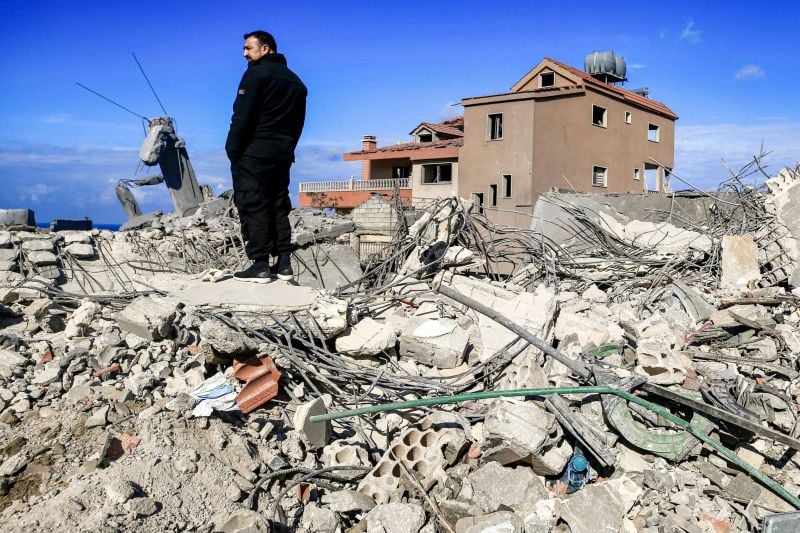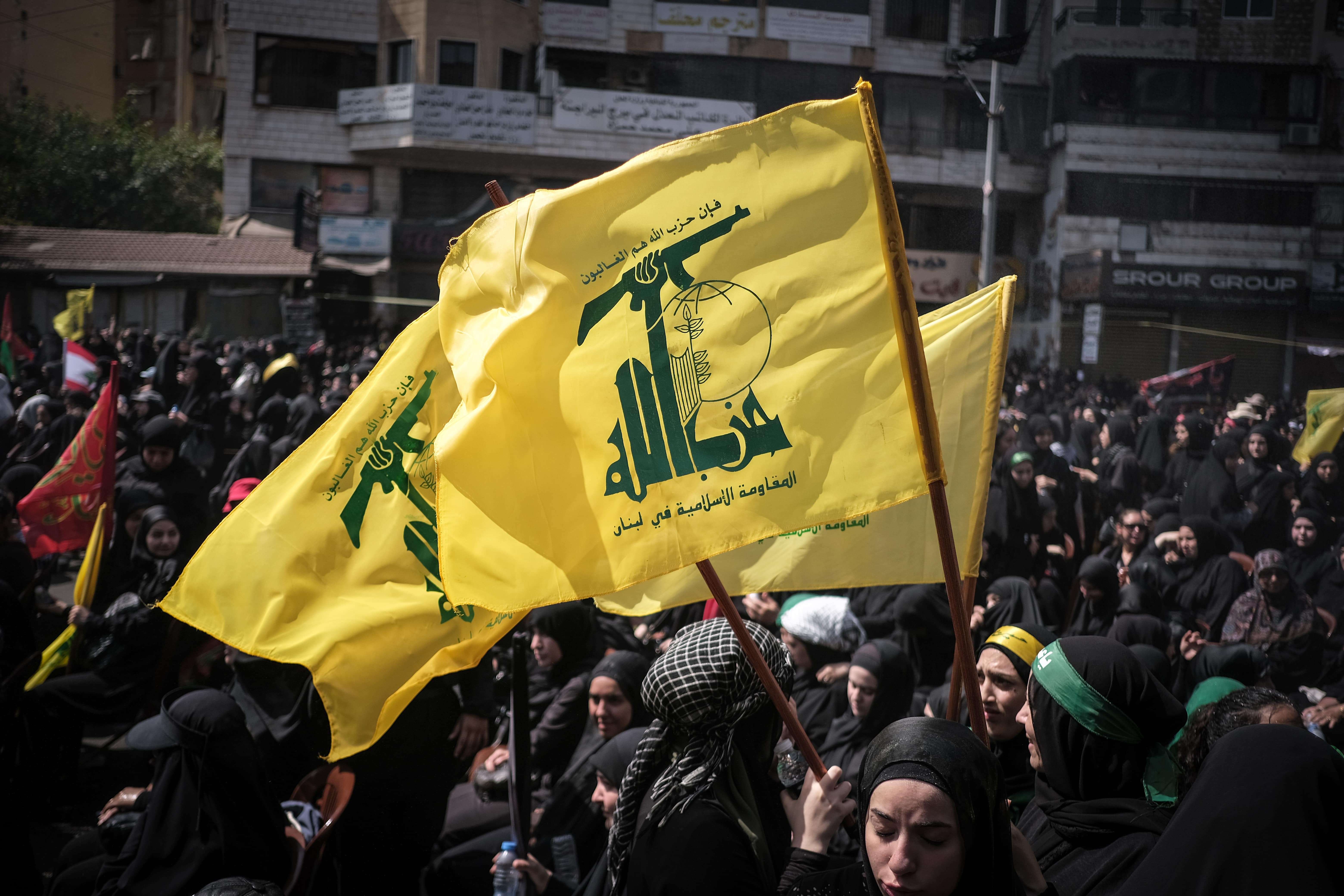
A man stands amidst the rubble of destroyed buildings following strikes on the town of Naqoura in southern Lebanon close to the border with northern Israel on Jan. 4, 2024. (Credit: AFP)
BEIRUT — For more than three months, Hezbollah and Israel have been trading daily cross-border fire, with a brief exception for the week-long cease-fire at the end of November, following which, the fighting significantly intensified.
What started out as both sides making more of a theatrical performance by targeting the outskirts of villages and military bases — only causing damage to the earth that the missiles fell on — has developed into fierce daylong confrontations with Israel bombing houses inside villages in southern Lebanon and assassinating Hamas leaders in Beirut’s southern suburbs. Meanwhile, Hezbollah is increasingly targeting groups of Israeli soldiers based along the border.
For the most part, Hezbollah has avoided escalating too far and has seemed focused on remaining in a supporting role, something Hezbollah Secretary-General Hassan Nasrallah spoke about in the first month of fighting, along with US intelligence reports stating that Hezbollah is not looking to get involved in a full-scale war with Israel.
While experts debate whether or not a full-scale war between Hezbollah and Israel is likely, Paul Salem, president of the DC-based Middle East Institute, told L’Orient Today that “we can never be sure what the Israelis, in effect, want to do.”
 A pro-Hezbollah and Hamas rally in Beirut, 2023. (Credit: João Sousa/L'Orient Today/File photo)
A pro-Hezbollah and Hamas rally in Beirut, 2023. (Credit: João Sousa/L'Orient Today/File photo)
A return to arms
The last all-out war between Hezbollah and Israel occurred 17 years ago in July 2006 after a Hezbollah operation along the border killed and captured Israeli soldiers, leading to then-Israeli Prime Minister Ehud Olmert ordering a disproportionate attack on Lebanon.
While it was a Hezbollah attack that sparked the month-long 2006 war, Salem and Mohanad Hage Ali, deputy director of research at the Carnegie Middle East Center in Beirut, both believe that, if a war does break out anew, this time it would be Israel initiating the conflict.
“On the Israeli side, there seems to be an interest in widening the scope of the conflict. This has been clear since day one when we were hearing about [Defense Minister Yoav] Gallant's interest in engaging in the northern front. The same thing with [Finance Minister Bezalel] Smotrich and [National Security Minister Itamar] Ben Gvir pushing this,” Hage Ali told L’Orient Today.
Israeli Prime Minister Benjamin Netanyahu, on Jan. 4, said that there needed to be a “fundamental change” on the Lebanese border, while other Israeli politicians said that their citizens needed to be able to go back to their homes and live safely and securely without the fear of Hezbollah rockets raining down on them.
Much of the rhetoric coming out of Israel has to do with an almost existential fear following Hamas’s Oct. 7 attack that killed 1,200 people and saw around 240 others kidnapped, more than 100 of whom remain in Gaza. It is almost reminiscent of Israel’s first war in 1948, during its establishment, and in 1973, when Egypt and Syria launched simultaneous surprise attacks from Israel’s north and south.
 A pro-Hezbollah rally in Beirut, 2023. (Credit: João Sousa/L'Orient Today/File photo)
A pro-Hezbollah rally in Beirut, 2023. (Credit: João Sousa/L'Orient Today/File photo)
Only upping the ante, on Friday, Jan. 5, Israeli Defense Minister Yoav Gallant said that time was running out for a political solution to the conflict on the “northern front.”
“We prefer the path of an agreed-upon diplomatic settlement,” Gallant stated, “but we are getting close to the point where the hourglass will turn over.”
The Washington Post also reported recently that some US officials were concerned that Netanyahu could open up a new front on the Lebanese border in the hopes of keeping his ailing political career alive amid poor polling numbers and calls for him to resign.
Meanwhile, Salem and Hage Ali believe that US pressure has been one of the leading factors in preventing a preemptive strike by Israel, which, US officials told The Washington Post, would result in “all hell breaking loose.”
Boots on the ground
During the initial phase of the 2006 war, Israel solely utilized its airpower, believing that it could deal a devastating blow to Hezbollah without having to put any Israeli soldiers on Lebanese soil. However, they quickly discovered that their airstrikes were having a minimal effect on the Iran-backed group and were doing nothing to put a stop to its military capabilities.
This is why Salem argued that Israel would launch a “limited ground invasion” to push Hezbollah out of Lebanon’s southern border region and to destroy Hezbollah’s military capabilities, such as its bunkers and rocket launching sites that are hidden throughout southern Lebanon.
“There could be a ground component to it up to a certain limit. Unlike Gaza, it would not be a full invasion because there is no such limit in Lebanon. What would you invade? You would keep on going to where? The Bekaa? I think that’s unreasonable. So it would be a limited invasion,” Salem explained.
 Hezbollah leader Hassan Nasrallah appears on screen at a rally in Lebanon, 2023. (Credit: João Sousa/L'Orient Today/File photo)
Hezbollah leader Hassan Nasrallah appears on screen at a rally in Lebanon, 2023. (Credit: João Sousa/L'Orient Today/File photo)
However, there would also be a lot of “collective punishment” of the southern Lebanese population, Salem said.
“The reason Hezbollah is deterred is because it doesn’t want its people to suffer. Israel takes that into account and says ‘We’ll make civilians suffer either by just not being very careful about going after targets or targeting potentially civilian areas or general infrastructure,’” he stated.
This “collective punishment” could be limited to the people residing in Hezbollah-dominated areas or, if Israel decided, could be expanded to Lebanon as a whole by targeting the Lebanese army, civilians and civilian infrastructure, according to Salem.
Hage Ali, though, argued that it would not be so easy for Israel to simply enter southern Lebanon and force Hezbollah further north.
“It would be risky for Israel to launch an invasion of Lebanon given Hezbollah’s support base in South Lebanon and the possibility of really fierce resistance against any Israeli invasion. So they will sustain high casualties and it doesn’t seem that the Israeli army is doing very well with that in Gaza,” he said.
The collective punishment of Lebanon in Israeli invasion would also work in Hezbollah’s favor by helping to “revive the fight against Israel,” according to Hage Ali
History repeats itself
An Israeli invasion of Lebanon could end after Israel destroys Hezbollah’s military infrastructure and capabilities in the southern region. However, many in Israel’s political and military establishment have spoken about establishing a “security zone” in southern Lebanon to prevent future attacks by Hezbollah.
In order to establish this “security zone” in southern Lebanon, Israel would likely have to reoccupy the region, taking both countries back to the 1980s and 1990s when Israel occupied the South after it forced the Palestine Liberation Organization (PLO) out of Lebanon and established a security corridor to prevent future attacks into Israel.
Neither Salem nor Hage Ali said they believe that an Israeli invasion of Lebanon and a subsequent occupation would go well for the Israelis.
“Hezbollah is many times more capable and powerful than Hamas. Hezbollah has strategic depth and can retreat and has Syria and has the Bekaa and has many areas whereas Hamas is stuck,” Salem stated.
Hage Ali added that Israel’s establishment of a security zone in the south made little practical sense given the technological and strategic advancements Hezbollah has made since the end of the occupation and the 17 years since they last fought.
The whole point of creating this security zone is to prevent future attacks. While Hage Ali said it would “create a buffer zone to stop the type of attacks that we’ve seen in towns around the Gaza Strip on the Oct. 7 operation,” Hezbollah’s rocket and missile capabilities are significantly more advanced than those of Hamas. Unlike Hamas, Salem added, Hezbollah continues to have a “massive capacity to … day after day and week after week take out major Israeli stuff.”
“Rocket attacks would continue and this would be a prolonged conflict of some sort. I don’t see the Israelis interested in having that on their borders forever. If this occurs, then we are talking about an all-out war and this is very costly for the Israelis,” Hage explained.
Even US intelligence, according to The Washington Post, is skeptical about Israel’s ability to take on Hezbollah and achieve any of its sought-after goals with so much of its resources still bogged down in Gaza, a war that Israeli officials say will continue throughout 2024.
‘Long and painful’
While Salem maintained that an Israeli invasion and occupation remains unlikely, he also “wouldn’t completely discount it” given that Israel ended its occupation of Gaza nearly 20 years ago and now there is talk about reoccupying the Strip.
“They already had a war in 2006 and it didn’t go great. They had an occupation and that didn’t end well. What worries me is the unpredictable mood in Israel where this is like 1948 or 1973, where there’s the risk that they think and act with a different metric,” he said.
It is also unlikely that the fighting would be confined to southern Lebanon and Israel. Hezbollah has a global network with reported cells around the globe. In November 2023, Brazil arrested three men for alleged connections to Hezbollah and for making plans to target Israeli and Jewish institutions in the country. During the occupation of southern Lebanon, Jewish and Israeli institutions were targeted in Buenos Aires and, in 2012, a bus carrying Israelis in Bulgaria was also bombed, all of which could repeat depending on how the war goes.
“This will be everyone’s fight in South Lebanon. It didn’t go well for Israel in the 80s and 90s and it will create bigger complications for the Israelis,” Hage Ali said.
“This will be sustained and it will be long and painful.”